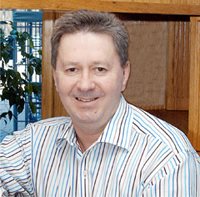
RCP CEO Sarel du Plessis: "The Afrikaans-speaking market is still very important and big enough to warrant its own marketing budget."
“One gets the impression that nowadays it is so much easier for advertising people to create advertisements in English, and, only if there is pressure from the marketer and client, will they attempt to make it work in Afrikaans - and that is precisely the problem. They should be inspired to create in original, effective Afrikaans and not merely translate advertising messages into Afrikaans: that's where the challenge lies.”
So says RCP Media (Rapport, City Press, and Sondag) CEO Sarel du Plessis.
And because Rapport deems the encouragement of original, impactful Afrikaans advertising of the utmost importance for this Afrikaans Sunday newspaper, it has once again come out in full support of the Pendoring Advertising Awards as a gold sponsor, says Du Plessis.
“As Rapport's pay-off line is 'We speak your language', it stands to reason that the newspaper also wants to manifest this through its involvement with Afrikaans advertising awards such as Pendoring.”
However, Rapport does not only speak your language, this popular Afrikaans Sunday newspaper also sings in your language, says Du Plessis. “We have adapted the pay-off line so often to reflect all of Rapport's activities that it has begun to hit home.”
Because Rapport, as the biggest Afrikaans Sunday paper in the world, still derives a significant portion of its income from Afrikaans advertising - which makes it an extremely profitable newspaper in the Media24 stable - it remains most important for it to continue encouraging advertising agencies to create the best possible Afrikaans advertising, not only for Rapport, but for Afrikaans media in general.
According to Du Plessis, print titles and TV programmes that are available for marketers who wish to work in an Afrikaans environment - Rapport, Die Burger, Beeld, Volksblad, Huisgenoot, kykNET and even the SABC (with programmes like Pasella and DeKat TV) attracts a significant amount of advertising compared to their English counterparts.
“Clearly, there is a big need in the Afrikaans-speaking community to see and hear advertisements and marketing material in their mother tongue.”
The dwindling number of Afrikaans advertising creatives is another reason why it is so important for Rapport to support advertising projects like Pendoring, stresses Du Plessis. “They need to think and create in Afrikaans, so it is important that young Afrikaans speakers are encouraged to join advertising agencies so that they can tackle Afrikaans advertising with great gusto.”
Du Plessis says Afrikaans is currently experiencing a boom second to none. This is evident in the growing number of Afrikaans music and arts festivals in South Africa that attracts thousands.
“On the one hand, companies need to realise that the Afrikaans market is still very important - and big enough to warrant its own marketing budget. On the other, media owners of strong, established Afrikaans titles can also contribute significantly to the revival of Afrikaans by throwing their weight behind worthy initiatives like Pendoring,” says Du Plessis.
While Pendoring primarily focuses on the encouragement and acknowledgement of effective and excellent Afrikaans advertising, it also strives to be fully inclusive by reflecting South Africa's rich language and cultural diversity - an increasing phenomenon in advertising and marketing - through the category Truly South African advertising for both agencies and students.
An interesting example that is also quite effective and often favourably debated is the TV advertising campaign for GM's ‘Red Tag Events'.
“While it is primarily an English campaign, Afrikaans viewers appreciate the ad where the man comes home, greets his wife and sits down at the dinner table with the comment: “Hallo, my vrou... this looks lekker... waar's ouma?” just as much as English viewers. This clearly shows that marketers are increasingly playing with a combination of English and Afrikaans in advertisements and that this is becoming increasingly acceptable in both communities,” says Du Plessis.